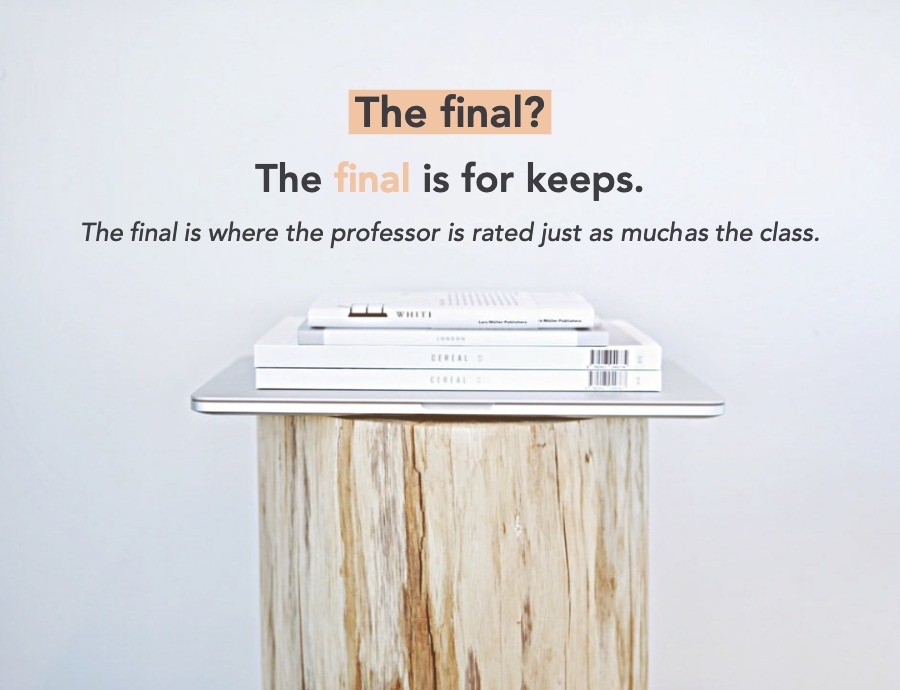The only universal lesson about learning is that there isn’t one universal lesson which works for all learning. People study and understand in different ways. Just because the professor teaches everyone the same way doesn’t mean everyone is going to learn like that. If there was one way which worked for everyone then every university would be the same, students shuffling into halls to stand in perfect rows while CALCULUS_YEAR1.MATH was uploaded into every brain.
But it doesn’t work like that. That’s why we have exams. If teaching worked automatically they wouldn’t have to test it! Unfortunately some students don’t realise this, and struggle with their own self-belief as well as the material. The suffer from false feelings of “just not getting” certain subjects instead of searching for a better way to understand it. Mismatches between the professor’s teaching style and the students’ learning can make things seem much more difficult than they actually are.
But that’s the first secret lesson of university: it’s up to the student to fill in the gaps. You’re no longer in school, where it’s the teacher’s responsibility to try to solve every problem. Instead you’ve come to a college and been given access to material which might help you. So make sure it does!
The first step to solving this problem is knowing that it even exists. You’re not stupid, you’re not a Dungeons and Dragon character with “0” in your Calculus stat. When someone thinks they “just can’t do” thermodynamics or inorganic chemistry it’ll become a self-fulfilling prophecy. You’re just having trouble with this style of teaching. Once you realize that you can make progress. When you know you just need a new angle on the subject you can search to find it.
What’s the right approach to learning? Well, like we just said, there isn’t one which works for everyone. But there is a way to find which one works for you. Break subjects into small parts. Try a different technique with each one: rewriting it, speaking it out loud, drawing pictures of it, reciting it from memory, try different tricks until you see what sticks. And if none stick, try them again, because repetition is another style all by itself.
Then focus this training: there are all kinds of different ways to learn, but unfortunately there’s only one way each course is going to be examined. Tilt your training towards the final exam. Practice what you’ll have to do. And you’ll find this focus reduces even the most complicated seeming course to a set of simpler questions.
But it doesn’t work like that. That’s why we have exams. If teaching worked automatically they wouldn’t have to test it! Unfortunately some students don’t realise this, and struggle with their own self-belief as well as the material. The suffer from false feelings of “just not getting” certain subjects instead of searching for a better way to understand it. Mismatches between the professor’s teaching style and the students’ learning can make things seem much more difficult than they actually are.
If you think you “just can’t do” a course you’ll prove yourself right.
But that’s the first secret lesson of university: it’s up to the student to fill in the gaps. You’re no longer in school, where it’s the teacher’s responsibility to try to solve every problem. Instead you’ve come to a college and been given access to material which might help you. So make sure it does!
The first step to solving this problem is knowing that it even exists. You’re not stupid, you’re not a Dungeons and Dragon character with “0” in your Calculus stat. When someone thinks they “just can’t do” thermodynamics or inorganic chemistry it’ll become a self-fulfilling prophecy. You’re just having trouble with this style of teaching. Once you realize that you can make progress. When you know you just need a new angle on the subject you can search to find it.
What’s the right approach to learning? Well, like we just said, there isn’t one which works for everyone. But there is a way to find which one works for you. Break subjects into small parts. Try a different technique with each one: rewriting it, speaking it out loud, drawing pictures of it, reciting it from memory, try different tricks until you see what sticks. And if none stick, try them again, because repetition is another style all by itself.
Then focus this training: there are all kinds of different ways to learn, but unfortunately there’s only one way each course is going to be examined. Tilt your training towards the final exam. Practice what you’ll have to do. And you’ll find this focus reduces even the most complicated seeming course to a set of simpler questions.








